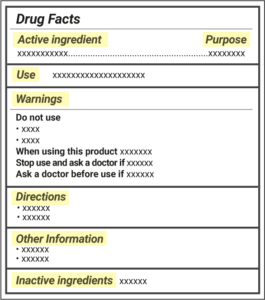

What do your aspirin, cough syrup, and seasonal allergy treatments have in common? They are all examples of over-the-counter (OTC) medicines – and that means that they all have a Drug Facts label on their packaging. You’ve probably seen this label many times before: it’s been the FDA-required standard for OTC product labeling for almost twenty years. The Drug Facts label helps to provide the essential information about an OTC medicine in an easy-to-read and easy-to-understand, uniform format.
Before taking any medicine (whether it’s prescription or OTC) it’s critically important to read the label. Reading the label can help you to understand the amount to take, how to take it, and provides any warnings. The Drug Facts label contains the following sections to help you to understand the critical information you need to know about your OTC medicine:

The OTC Drug Facts Label
Reading the label before taking any medicine is critical: it can help you to take the correct dose, recognize side effects, and understand when to speak with your pharmacist or doctor. Your medicine’s label and packaging are also helpful resources for understanding proper storage conditions – and even how long you can store the product before disposing of it properly.
Your OTC product’s expiration date isn’t included on the Drug Facts label but can typically be found printed on the outer packaging, or directly on the bottle or blister pack of the medicine. The FDA recommends not to use your medicine when it’s past the expiration date, as there is no guarantee that it will be effective or even safe to take. You should always check the expiration date before taking medicine, and dispose of it securely and promptly once it’s expired or no longer needed.

Make 2022 the year you focus on safe handling, storage, and disposal of your household medicines~ Ushering in a new…
Read More
Your pharmacist is an important member of your healthcare team ~ A critical member of your healthcare team may be…
Read More
Medicine safety for kids ~ If you're a parent or guardian, there are certain steps you can take to help…
Read More
Make it a habit to check your medicine cabinet ~ Ah, spring cleaning. That annual ritual when you throw open…
Read More